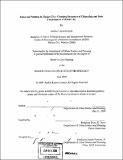Universal pensions in Mexico City : changing dynamics of citizenship and state formation in a global city
Author(s)
Lajous-Loaeza, Andrés
DownloadFull printable version (9.799Mb)
Other Contributors
Massachusetts Institute of Technology. Dept. of Urban Studies and Planning.
Advisor
Diane E. Davis.
Terms of use
Metadata
Show full item recordAbstract
The main topic of this study is the enactment of a non-contributory and non-means-tested Universal Pension (Pension Alimentaria Ciudadana para Adultos Mayores) program in Mexico City directed at city residents 70 years of age or older. A state-centered framework for social policy analysis is used to understand why and how was this policy implemented at the local level considering that it pertains a policy area that is normally restricted to national states. In order to show that there is a distinct local state in Mexico City, from the national state, the study explores the impulse international economic changes gave to the decentralization and democratization processes that took place in Mexico in the last few decades. As a consequence of these processes, an additional process of local state formation has taken place in the city, itself having larger consequences at the national level. To show how this process is taking place a series of political conflicts among city institutions and also national institutions in the 2000 - 2003 period are narrated. This process of local state formation prominently includes the change in the relationship between the state and society, from a relationship structured around corporatist institutions to a broader notion of citizenship through the introduction of a non-contributory universal pension.
Description
Thesis (M.C.P.)--Massachusetts Institute of Technology, Dept. of Urban Studies and Planning, 2009. Includes bibliographical references (p. 110-116).
Date issued
2009Department
Massachusetts Institute of Technology. Department of Urban Studies and PlanningPublisher
Massachusetts Institute of Technology
Keywords
Urban Studies and Planning.